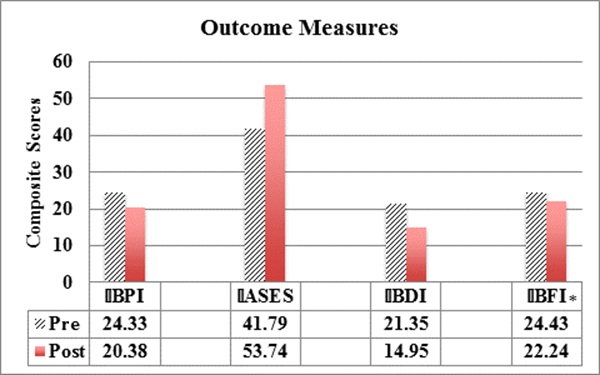Session Information
Date: Monday, November 14, 2016
Title: Education - ARHP Poster
Session Type: ACR Poster Session B
Session Time: 9:00AM-11:00AM
Background/Purpose: Arthritis is the leading cause of chronic pain and disability in the United States. Two thirds of patients report inadequate pain control. Coping Skills Training (CST), a well recognized self-management program traditionally delivered by mental health providers, decreases pain and disability and improves self-efficacy. Yet, access to CST remains limited. The purpose of this pilot study is to evaluate the feasibility and effectiveness of nurse practitioners (NPs) delivering group CST in a suburban rheumatology private practice.
Methods: A convenience sample of 39 osteoarthritis patients with chronic pain participated in a 10-week CST program delivered by a trained adult NP. There were approximately 10 patients in each of 4 groups. The feasibility of delivering group CST was measured through completion of at least 50% of the program. Effectiveness was assessed through change scores from pre and post treatment measures of pain, depression, coping, and self-efficacy using paired t-tests.
Results: The sample was primarily Caucasian (92%), female (87%), 60 years of age with 13 years of moderate to severe osteoarthritis (71.8%) and most carrying co morbid rheumatologic conditions (72%). Overall, subjects reported being very satisfied with the program, group process, content and leadership by the NP. Non-completers (n=17) were not statistically different at baseline than completers and described mostly logistical issues and medical problems as reasons for attrition. For those who completed the program (n=22), there was a significant improvement in pain, depression, coping, and self-efficacy. Table 1 Feasibility of Group Process for 10 Week Program, N=22
| Item | Mean |
| Likert Scale: 0= Not at all, 6= Very | |
| Importance of Group | 5.57 |
| Usefulness of hearing others | 5.85 |
| Comfortable discussing issues | 5.78 |
| How adequate was the length? | 5.30 |
| Were your needs met? | 5.40 |
| Difficulty getting to sessions | 2.80 |
| Average # Sessions Attended | 8.2(range 6-10) |
| % | |
| Completion (n=22) | 56 |
| Non Completers (n=17) | 44 |
Figure 1 Outcome Measures
Conclusion: This pilot study provides preliminary evidence to support the use of adult health NPs to deliver CST to patients with chronic pain seen in private practice settings. Additionally, it has the potential to broaden the scope of advanced practice nursing and dramatically increase access to this important self-management technique.
To cite this abstract in AMA style:
Stamatos CA, Bruckenthal P. Promoting Self-Management Techniques for Osteoarthritis Pain: a Pilot Study of Nurse Practitioner Led Coping Skills Training [abstract]. Arthritis Rheumatol. 2016; 68 (suppl 10). https://acrabstracts.org/abstract/promoting-self-management-techniques-for-osteoarthritis-pain-a-pilot-study-of-nurse-practitioner-led-coping-skills-training/. Accessed .« Back to 2016 ACR/ARHP Annual Meeting
ACR Meeting Abstracts - https://acrabstracts.org/abstract/promoting-self-management-techniques-for-osteoarthritis-pain-a-pilot-study-of-nurse-practitioner-led-coping-skills-training/


